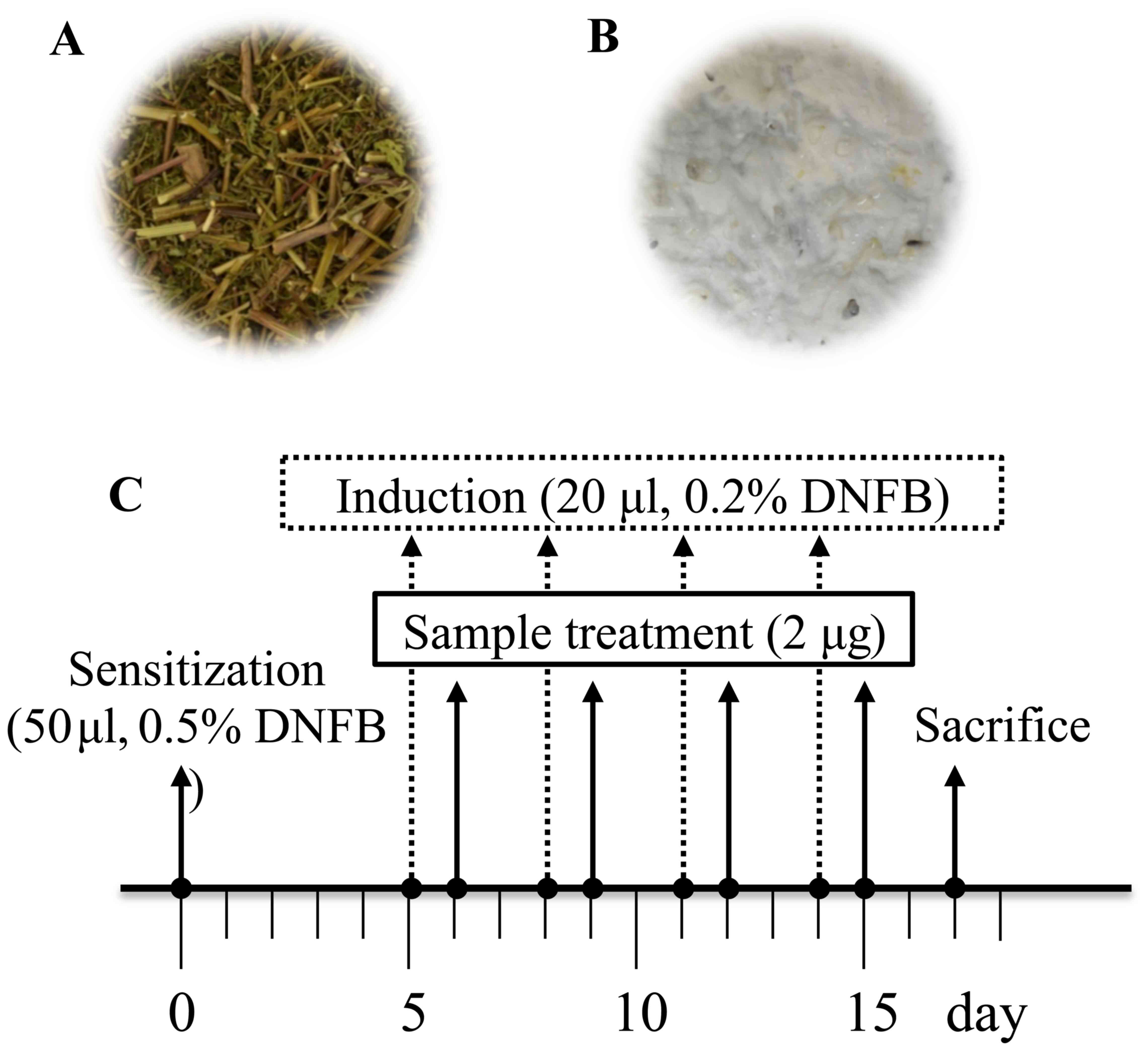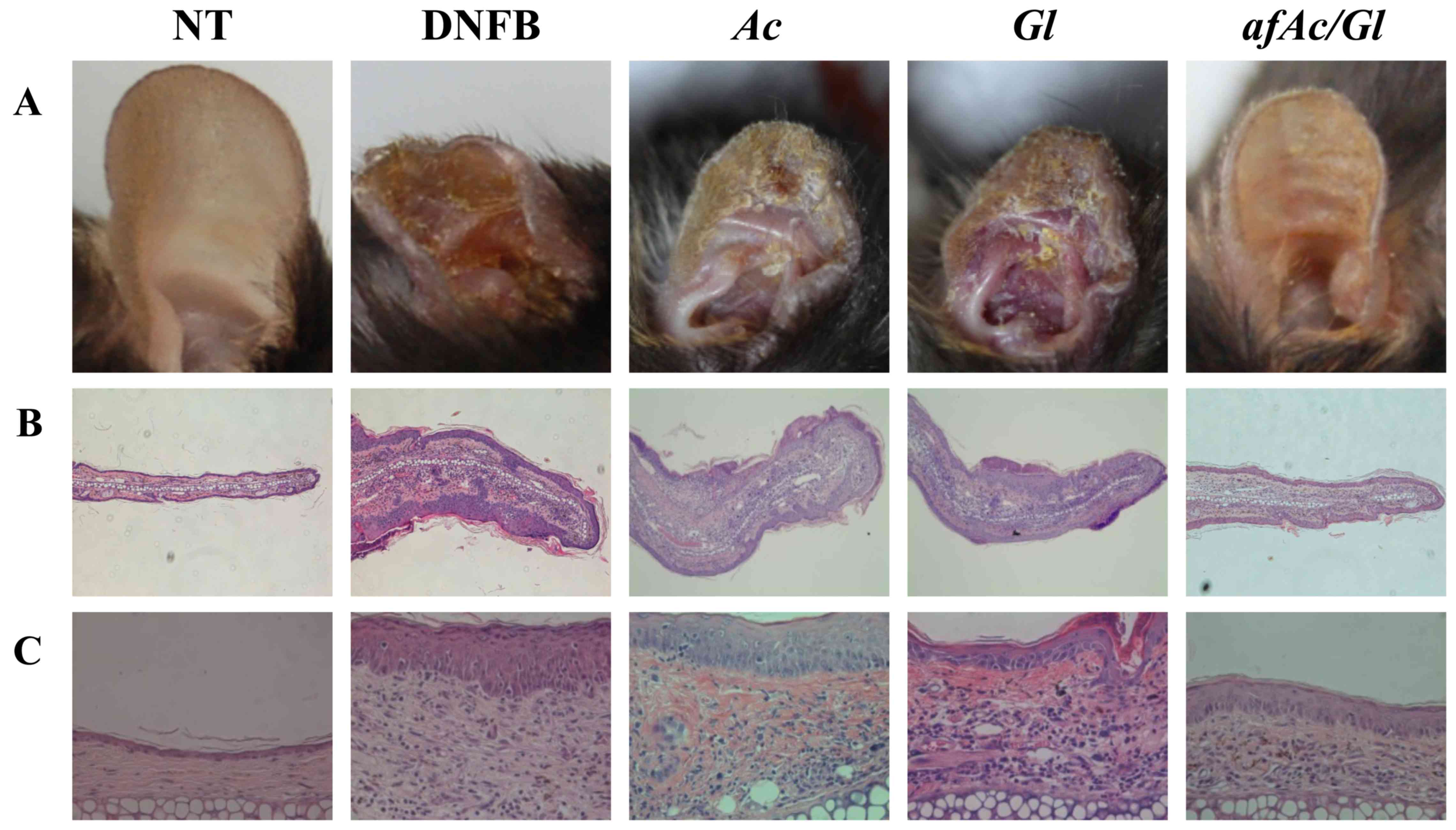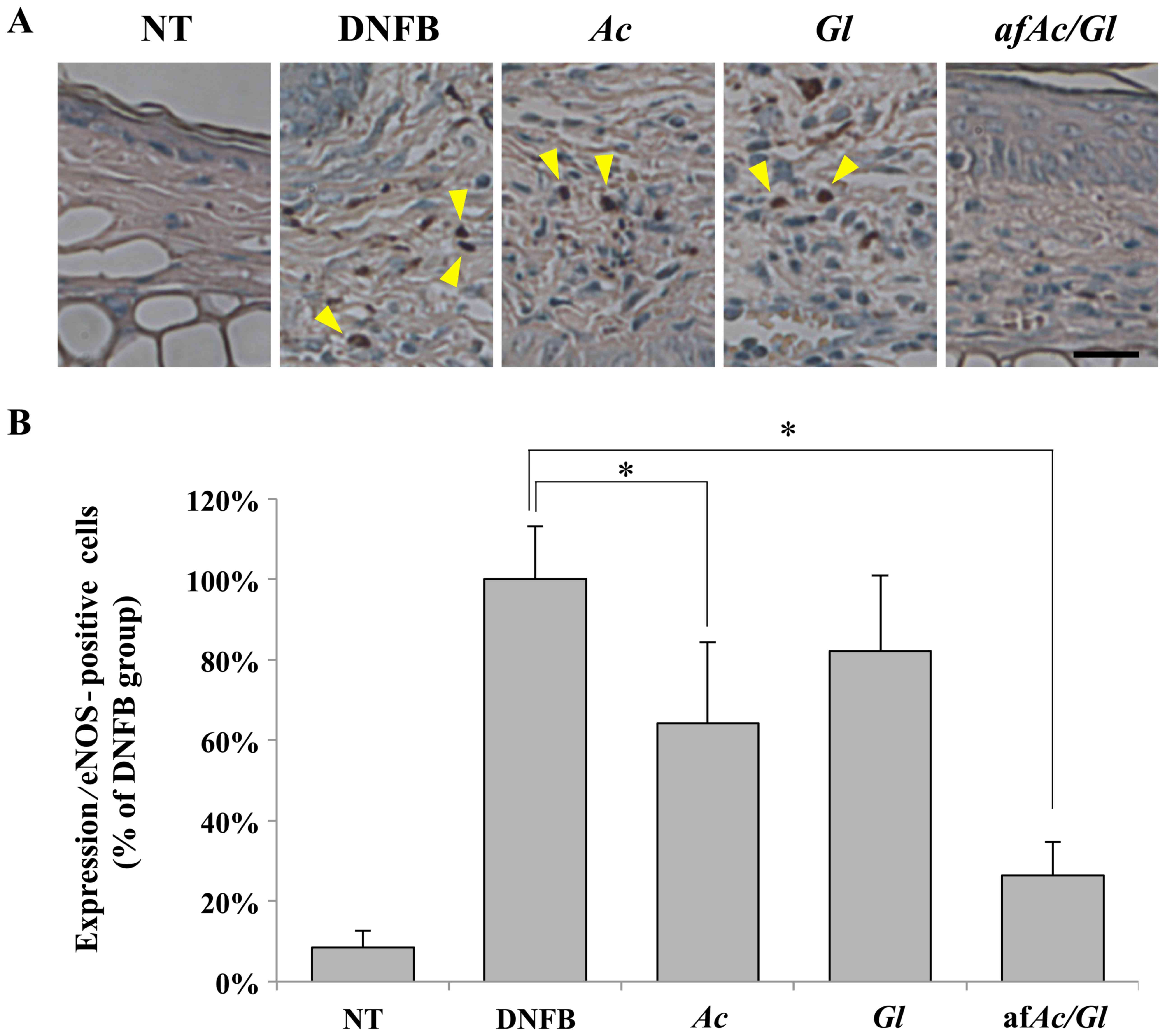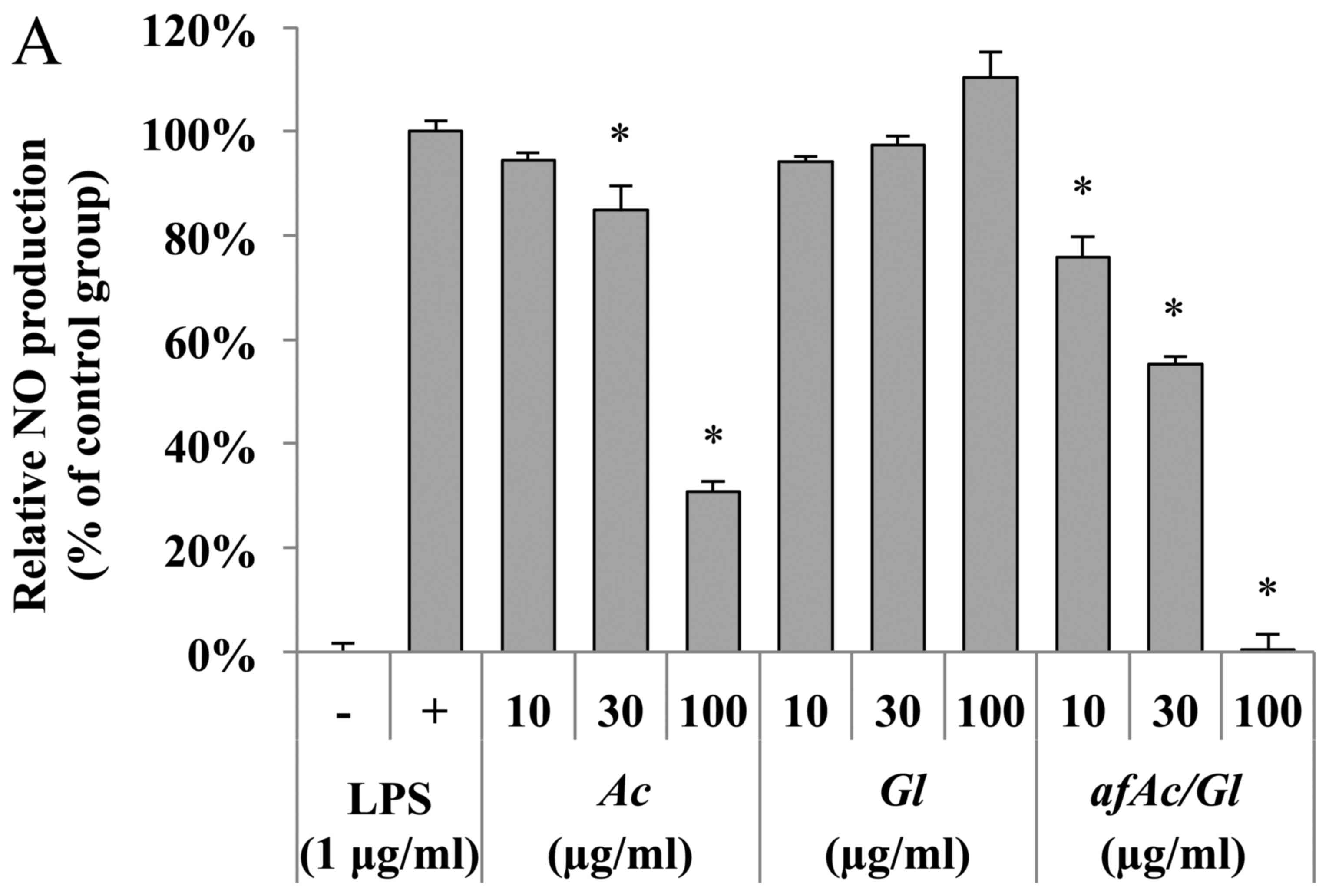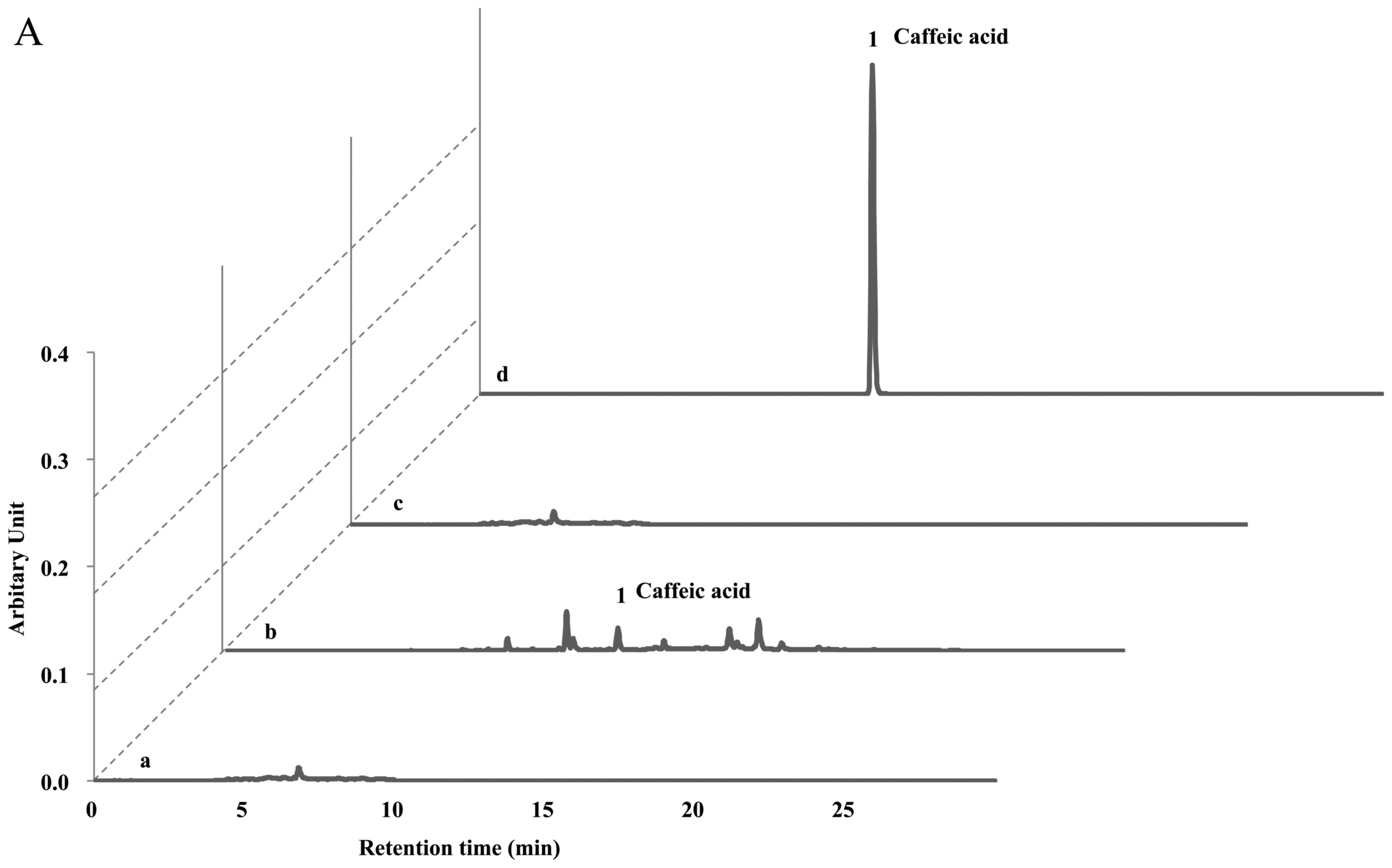|
1
|
Ring J, Alomar A, Bieber T, Deleuran M,
Fink-Wagner A, Gelmetti C, Gieler U, Lipozencic J, Luger T, Oranje
AP, et al European Dermatology Forum (EDF); European Academy of
Dermatology and Venereology (EADV); European Federation of Allergy
(EFA); European Task Force on Atopic Dermatitis (ETFAD); European
Society of Pediatric Dermatology (ESPD); Global Allergy and Asthma
European Network (GA2LEN): Guidelines for treatment of atopic
eczema (atopic dermatitis) part I. J Eur Acad Dermatol Venereol.
26:1045–1060. 2012. View Article : Google Scholar : PubMed/NCBI
|
|
2
|
Leung DY, Boguniewicz M, Howell MD, Nomura
I and Hamid QA: New insights into atopic dermatitis. J Clin Invest.
113:651–657. 2004. View
Article : Google Scholar : PubMed/NCBI
|
|
3
|
Harper JI, Godwin H, Green A, Wilkes LE,
Holden NJ, Moffatt M, Cookson WO, Layton G and Chandler S: A study
of matrix metalloproteinase expression and activity in atopic
dermatitis using a novel skin wash sampling assay for functional
biomarker analysis. Br J Dermatol. 162:397–403. 2010. View Article : Google Scholar
|
|
4
|
Jeong MS, Choi SE, Kim JY, Kim JS, Kim EJ,
Park KH, Lee do I, Joo SS, Lee CS, Bang H, et al: Atopic
dermatitis-like skin lesions reduced by topical application and
intraperitoneal injection of hirsutenone in NC/Nga mice. Clin Dev
Immunol. 2010:6185172010. View Article : Google Scholar :
|
|
5
|
Kim JB, Han AR, Park EY, Kim JY, Cho W,
Lee J, Seo EK and Lee KT: Inhibition of LPS-induced iNOS, COX-2 and
cytokines expression by poncirin through the NF-kappaB inactivation
in RAW 264.7 macrophage cells. Biol Pharm Bull. 30:2345–2351. 2007.
View Article : Google Scholar : PubMed/NCBI
|
|
6
|
Hong SH, Seo SH, Lee JH and Choi BT: The
aqueous extract from Artemisia capillaris Thunb. inhibits
lipopolysaccharide-induced inflammatory response through preventing
NF-kappaB activation in human hepatoma cell line and rat liver. Int
J Mol Med. 13:717–720. 2004.PubMed/NCBI
|
|
7
|
Jang E, Shin MH, Kim KS, Kim Y, Na YC, Woo
HJ, Kim Y, Lee JH and Jang HJ: Anti-lipoapoptotic effect of
Artemisia capillaris extract on free fatty acids-induced HepG2
cells. BMC Complement Altern Med. 14:2532014. View Article : Google Scholar : PubMed/NCBI
|
|
8
|
Feng G, Wang X, You C, Cheng X, Han Z,
Zong L, Zhou C and Zhang M: Antiproliferative potential of
Artemisia capillaris polysaccharide against human nasopharyngeal
carcinoma cells. Carbohydr Polym. 92:1040–1045. 2013. View Article : Google Scholar : PubMed/NCBI
|
|
9
|
Lee JH, Park EK, Uhm CS, Chung MS and Kim
KH: Inhibition of Helicobacter pylori adhesion to human gastric
adenocarcinoma epithelial cells by acidic polysaccharides from
Artemisia capillaris and Panax ginseng. Planta Med. 70:615–619.
2004. View Article : Google Scholar : PubMed/NCBI
|
|
10
|
Lee HI, Seo KO, Yun KW, Kim MJ and Lee MK:
Comparative study of the and Artemisia hepatoprotective efficacy of
Artemisia iwayomogi capillaris on ethanol-administered mice. J Food
Sci. 76:T207–T211. 2011. View Article : Google Scholar
|
|
11
|
Ha H, Lee H, Seo CS, Lim HS, Lee JK, Lee
MY and Shin H: Artemisia capillaris inhibits atopic dermatitis-like
skin lesions in Dermatophagoides farinae-sensitized Nc/Nga mice.
BMC Complement Altern Med. 14:1002014. View Article : Google Scholar : PubMed/NCBI
|
|
12
|
Martins S, Mussatto SI, Martínez-Avila G,
Montañez-Saenz J, Aguilar CN and Teixeira JA: Bioactive phenolic
compounds: Production and extraction by solid-state fermentation. A
review Biotechnol Adv. 29:365–373. 2011. View Article : Google Scholar
|
|
13
|
Lee IH, Hung YH and Chou CC: Solid-state
fermentation with fungi to enhance the antioxidative activity,
total phenolic and anthocyanin contents of black bean. Int J Food
Microbiol. 121:150–156. 2008. View Article : Google Scholar
|
|
14
|
Postemsky P and Curvetto N: Enhancement of
wheat grain antioxidant activity by solid state fermentation with
Grifola spp. J Med Food. 17:543–549. 2014. View Article : Google Scholar : PubMed/NCBI
|
|
15
|
Sánchez-Magaña LM, Cuevas-Rodríguez EO,
Gutiérrez-Dorado R, Ayala-Rodríguez AE, Valdez-Ortiz A,
Milán-Carrillo J and Reyes-Moreno C: Solid-state bioconversion of
chickpea (Cicer arietinum L.) by Rhizopus oligosporus to improve
total phenolic content, antioxidant activity and hypoglycemic
functionality. Int J Food Sci Nutr. 65:558–564. 2014. View Article : Google Scholar : PubMed/NCBI
|
|
16
|
Charlton E: Ethical guidelines for pain
research in humans. Committee on Ethical Issues of the
International Association for the Study of Pain. Pain. 63:277–278.
1995. View Article : Google Scholar : PubMed/NCBI
|
|
17
|
Shin YK, Son HU, Kim JM, Heo JC, Lee SH
and Kim JG: Cinnamomum cassia bark produced by solid-state
fermentation with Phellinus baumii has the potential to alleviate
atopic dermatitis-related symptoms. Int J Mol Med. 35:187–194.
2015.
|
|
18
|
Bhol KC and Schechter PJ: Topical
nanocrystalline silver cream suppresses inflammatory cytokines and
induces apoptosis of inflammatory cells in a murine model of
allergic contact dermatitis. Br J Dermatol. 152:1235–1242. 2005.
View Article : Google Scholar : PubMed/NCBI
|
|
19
|
Choi EM and Hwang JK: Antiinflammatory,
analgesic and antioxidant activities of the fruit of Foeniculum
vulgare. Fitoterapia. 75:557–565. 2004. View Article : Google Scholar : PubMed/NCBI
|
|
20
|
Sato Y, Mukai K, Watanabe S, Goto M and
Shimosato Y: The AMeX method. A simplified technique of tissue
processing and paraffin embedding with improved preservation of
antigens for immunostaining. Am J Pathol. 125:431–435.
1986.PubMed/NCBI
|
|
21
|
Haines DM and Chelack BJ: Technical
considerations for developing enzyme immunohistochemical staining
procedures on formalin-fixed paraffin-embedded tissues for
diagnostic pathology. J Vet Diagn Invest. 3:101–112. 1991.
View Article : Google Scholar : PubMed/NCBI
|
|
22
|
Ständer S and Steinhoff M: Pathophysiology
of pruritus in atopic dermatitis: An overview. Exp Dermatol.
11:12–24. 2002. View Article : Google Scholar : PubMed/NCBI
|
|
23
|
Patruno A, Franceschelli S, Pesce M,
Maccallini C, Fantacuzzi M, Speranza L, Ferrone A, De Lutiis MA,
Ricciotti E, Amoroso R, et al: Novel aminobenzyl-acetamidine
derivative modulate the differential regulation of NOSs in LPS
induced inflammatory response: Role of I3K/Akt pathway. Biochim
Biophys Acta. 1820:2095–2104. 2012. View Article : Google Scholar : PubMed/NCBI
|
|
24
|
Hollá LI, Bucková D, Kuhrová V,
Stejskalová A, Francová H, Znojil V and Vácha J: Prevalence of
endothelial nitric oxide synthase gene polymorphisms in patients
with atopic asthma. Clin Exp Allergy. 32:1193–1198. 2002.
View Article : Google Scholar : PubMed/NCBI
|
|
25
|
Yao S, Pandey P, Ljunggren-Rose A and
Sriram S: LPS mediated injury to oligodendrocytes is mediated by
the activation of nNOS: Relevance to human demyelinating disease.
Nitric Oxide. 22:197–204. 2010. View Article : Google Scholar
|
|
26
|
Moncada S and Higgs EA: Endogenous nitric
oxide: Physiology, pathology and clinical relevance. Eur J Clin
Invest. 21:361–374. 1991. View Article : Google Scholar : PubMed/NCBI
|
|
27
|
Jee MK, Im YB, Choi JI and Kang SK:
Compensation of cATSCs-derived TGFβ1 and IL10 expressions was
effectively modulated atopic dermatitis. Cell Death Dis.
4:e4972013. View Article : Google Scholar
|
|
28
|
Rowe A, Farrell AM and Bunker CB:
Constitutive endothelial and inducible nitric oxide synthase in
inflammatory dermatoses. Br J Dermatol. 136:18–23. 1997. View Article : Google Scholar : PubMed/NCBI
|
|
29
|
Okaniwa N, Sasaki M, Mizushima T,
Ogasawara N, Funaki Y, Joh T and Kasugai K: eNOS plays an important
role in the regulation of colonic inflammation: A novel therapeutic
target and a predictive marker for the prognosis of ulcerative
colitis. Free Radic Res. 49:35–44. 2015. View Article : Google Scholar
|
|
30
|
De Sanctis GT, MacLean JA, Hamada K, Mehta
S, Scott JA, Jiao A, Yandava CN, Kobzik L, Wolyniec WW, Fabian AJ,
et al: Contribution of nitric oxide synthases 1, 2, and 3 to airway
hyper-responsiveness and inflammation in a murine model of asthma.
J Exp Med. 189:1621–1630. 1999. View Article : Google Scholar : PubMed/NCBI
|
|
31
|
Vandenbroucke RE and Libert C: Is there
new hope for therapeutic matrix metalloproteinase inhibition? Nat
Rev Drug Discov. 13:904–927. 2014. View Article : Google Scholar : PubMed/NCBI
|
|
32
|
Kim DY, Park BS, Hong GU, Lee BJ, Park JW,
Kim SY and Ro JY: Anti-inflammatory effects of the R2 peptide, an
inhibitor of transglutaminase 2, in a mouse model of allergic
asthma, induced by ovalbumin. Br J Pharmacol. 162:210–225. 2011.
View Article : Google Scholar :
|
|
33
|
Jin H, Oyoshi MK, Le Y, Bianchi T, Koduru
S, Mathias CB, Kumar L, Le Bras S, Young D, Collins M, et al:
IL-21R is essential for epicutaneous sensitization and allergic
skin inflammation in humans and mice. J Clin Invest. 119:47–60.
2009.
|
|
34
|
Heo JC, Nam DY, Seo MS and Lee SH:
Alleviation of atopic dermatitis-related symptoms by Perilla
frutescens Britton. Int J Mol Med. 28:733–737. 2011.PubMed/NCBI
|
|
35
|
Toumpanakis D, Noussia O, Sigala I,
Litsiou E, Loverdos K, Zacharatos P, Karavana V, Michailidou T,
Magkou C, Zhou Z, et al: Inspiratory resistive breathing induces
MMP-9 and MMP-12 expression in the lung. Am J Physiol Lung Cell Mol
Physiol. 308:L683–L692. 2015. View Article : Google Scholar : PubMed/NCBI
|
|
36
|
Reel B, Sala-Newby GB, Huang WC and Newby
AC: Diverse patterns of cyclooxygenase-independent
metalloproteinase gene regulation in human monocytes. Br J
Pharmacol. 163:1679–1690. 2011. View Article : Google Scholar : PubMed/NCBI
|
|
37
|
Corry DB, Kiss A, Song LZ, Song L, Xu J,
Lee SH, Werb Z and Kheradmand F: Overlapping and independent
contributions of MMP2 and MMP9 to lung allergic inflammatory cell
egression through decreased CC chemokines. FASEB J. 18:995–997.
2004.PubMed/NCBI
|
|
38
|
Corry DB, Rishi K, Kanellis J, Kiss A,
Song Lz LZ, Xu J, Feng L, Werb Z and Kheradmand F: Decreased
allergic lung inflammatory cell egression and increased
susceptibility to asphyxiation in MMP2-deficiency. Nat Immunol.
3:347–353. 2002. View
Article : Google Scholar : PubMed/NCBI
|
|
39
|
Gueders MM, Hirst SJ, Quesada-Calvo F,
Paulissen G, Hacha J, Gilles C, Gosset P, Louis R, Foidart JM,
Lopez-Otin C, et al: Matrix metalloproteinase-19 deficiency
promotes tenascin-C accumulation and allergen-induced airway
inflammation. Am J Respir Cell Mol Biol. 43:286–295. 2010.
View Article : Google Scholar
|















